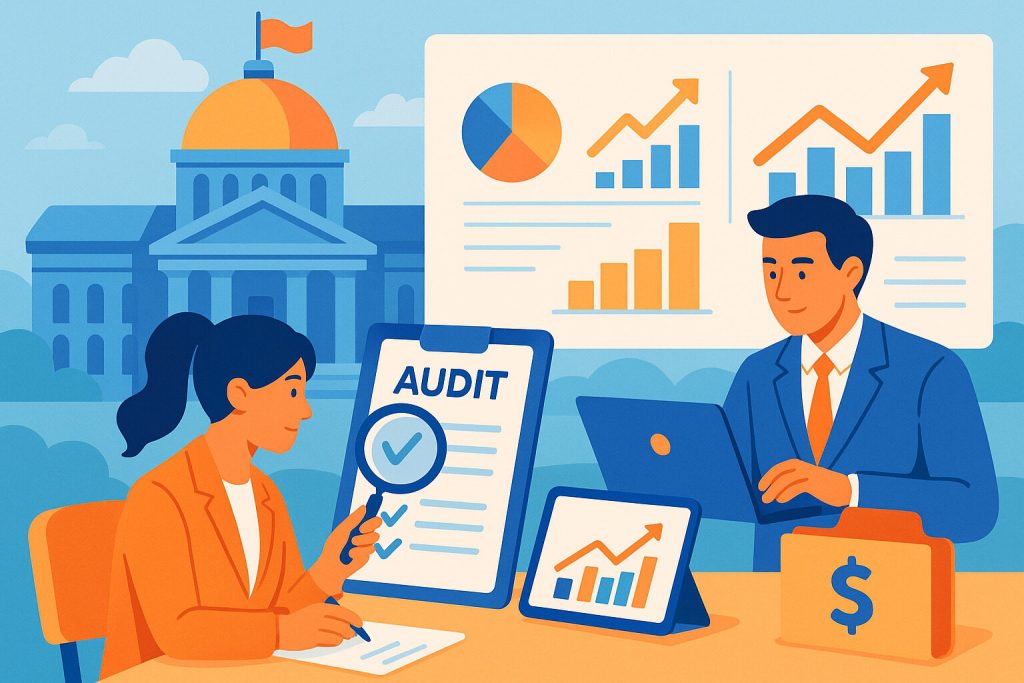
Building Trust Through Transparency
People expect their governments to manage public funds responsibly. When money is collected through taxes, fees, or aid, there’s a shared belief it should be used well. Fiscal audits play a central role in keeping that trust strong.
An audit looks at where money comes from, where it goes, and whether rules were followed. It checks if funds were used for their intended purposes and if any waste or mistakes occurred. When audits are done regularly and thoroughly, the public sees clear signs that oversight exists.
This visibility matters. It shows citizens that governments are watching themselves too. When leaders know they’ll be audited, they’re more likely to act carefully—and that helps protect community resources.
Helping Officials Find Weak Spots
Audits aren’t just for pointing fingers. They also help leaders spot areas that need fixing. A department might be using outdated software or processing claims too slowly. An audit brings these problems to light so improvements can begin.
Often, staff aren’t aware of certain gaps until an auditor takes a closer look. An outside view can highlight patterns that insiders miss—like late payments, missing receipts, or unbalanced budgets. These findings guide better planning.
By using audit results as learning tools, governments gain more than corrections. They build stronger systems. With each cycle, the work becomes more efficient, more fair, and easier to explain to the public.
Preventing Fraud Before It Starts
No system is perfect, and public agencies are sometimes targets for fraud. But regular fiscal audits help reduce the risk. When people know that someone is watching, they’re less likely to try dishonest acts in the first place.
Audits track funds through every step—how they were approved, recorded, and spent. If something looks suspicious, auditors ask questions. This not only helps catch errors but discourages wrongdoing early on.
Creating an environment where misuse is harder to hide makes a difference. It protects taxpayer money and reminds staff that accountability isn’t just about punishment—it’s about shared responsibility.
Improving Budget Planning Over Time
Each audit gives a snapshot of how money moved during a certain period. These snapshots, year after year, help leaders understand where resources are being stretched and where they might be going unused.
That insight supports smarter budgeting. If one department repeatedly spends less than expected, maybe its budget can shift to an area with higher needs. If another overspends, leaders can dig into why, review procurement policies, and adjust goals accordingly.
Patterns revealed through audits guide future decisions. Over time, this leads to better balance across services—making sure funds go where they’re most effective and reducing sudden surprises.
Strengthening Internal Controls
Good policies are only useful if people follow them. Fiscal audits help check whether those policies are working in real settings. Are staff following procurement steps? Are approvals happening the right way? Is there enough oversight for large purchases?
When internal controls are weak, audits make recommendations to tighten them. Sometimes that means changing who approves payments. Other times it’s about setting better limits or separating duties so one person doesn’t hold too much control.
These changes support fairness and accuracy. They also create clear rules that help staff work with more confidence, knowing the system is built to support integrity.
Encouraging Open Communication
Audits aren’t just quiet reviews behind closed doors. When results are shared with departments and the public, they open the door to honest conversations. Leaders and staff can talk about what worked, what didn’t, and what can be improved together.
This transparency lowers defensiveness. Instead of viewing audits as threats, departments can see them as tools. A clear report creates space for feedback, solutions, and joint problem-solving.
In the long run, open communication fosters stronger partnerships between government offices and the communities they serve. Everyone benefits from shared goals and better understanding.
Supporting Legislative Oversight
Elected officials rely on facts to make decisions about budgets, laws, and oversight. Fiscal audits provide those facts. They help lawmakers understand how agencies are spending money and whether promises to voters are being kept.
For example, a legislature reviewing education spending can use audit data to see if funding reached the right programs. If results fall short, lawmakers can respond with changes to policy or funding strategies.
Audits keep the conversation grounded. They give lawmakers something concrete to act on—not just opinions, but real data drawn from government records and operations.
Boosting Confidence in Government Services
When people know that their taxes are being tracked and used wisely, they feel better about the public services they rely on—like transportation, sanitation, schools, or health care. Audits help confirm that those services are getting the support they need.
Clear financial records also encourage support for new initiatives. If voters trust that their money will be handled responsibly, they’re more likely to back bond measures or funding programs. A history of good audits builds that trust over time.
Even when problems are found, honest reporting helps. It shows that governments are willing to own their mistakes and fix them—a sign of accountability that strengthens long-term relationships with the public.
Supporting Crisis Recovery and Aid Monitoring
After a natural disaster or economic crisis, governments often receive emergency funds. These funds must be spent quickly—but also carefully. Audits help make sure aid reaches the people who need it and isn’t wasted or delayed.
During recovery, fiscal checks help track how quickly funds move and whether they are meeting urgent goals. If problems arise—like duplicate payments or lost invoices—audits help identify and solve them before damage grows.
Well-monitored recovery spending builds public support. It also creates a record that outside agencies and donors can trust, increasing the chances of receiving future aid when new challenges appear.
Raising the Bar for Public Leadership
At their best, audits support better leadership. When mayors, governors, or agency heads know that their financial decisions will be reviewed, they often aim higher. They think not just about what they can do, but how they’ll explain it.
This mindset encourages forward thinking. Leaders may choose programs that show long-term value, not just short-term gain. They’ll weigh both cost and impact. And they’ll care more about how their decisions look under close review.
In this way, audits lift expectations—not just for dollars and cents, but for thoughtful, honest service. And when leadership rises to meet those expectations, the entire government performs better.


